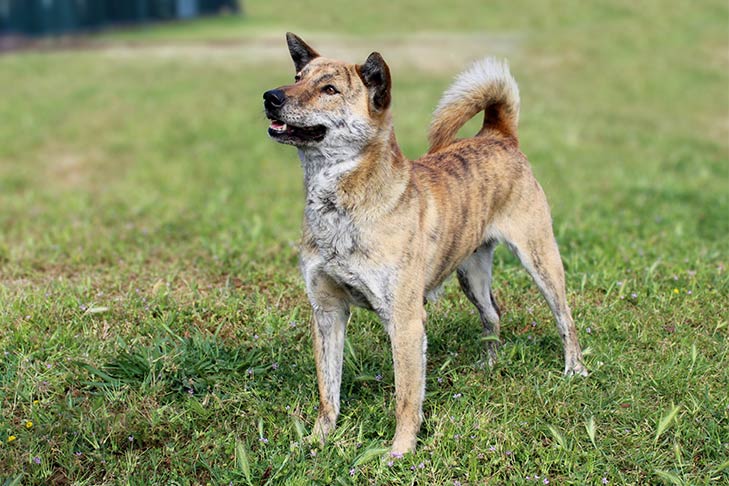Are you considering getting a Jindo breed dog as a pet? If so, you are in for a loyal and intelligent companion. The Jindo is a breed of dog that originated in South Korea and is known for its bravery, strength, and strong hunting instincts. They are a medium-sized dog that typically weighs between 35 and 50 pounds and have a thick, double coat that comes in a range of colors. While they make great pets, Jindos are not for everyone, as they require a lot of attention and training to thrive. In this article, we will explore the characteristics of the Jindo breed and help you decide if this is the right dog for you.
Breed Category: Spitz-type
Country of Origin: South Korea
Average Size:45-55 cm
Average Weight:16-23 kg
Average Life Span: 12-15 years
Grooming Requirements: Moderate
Exercise Requirements:High
History and Origin
The Jindo is a breed of dog that originated in Jindo Island, South Korea. The breed is known for its loyalty, intelligence, and hunting skills. The Jindo has been recognized as a national treasure in South Korea and is considered one of the country’s most beloved breeds.
The history of the Jindo can be traced back to the 14th century, where it was used as a hunting dog. The breed was originally developed to hunt wild boar, deer, and other large game. The Jindo’s hunting skills were highly valued by the people of Jindo Island, and the breed was often used for hunting competitions.
The Jindo’s popularity began to spread beyond Jindo Island in the 20th century. In the 1930s, the breed was introduced to mainland Korea, where it quickly gained popularity. The Jindo’s reputation as a loyal and intelligent dog made it a popular choice for families and farmers.
During the Korean War, the Jindo’s population declined significantly. Many dogs were killed or taken by soldiers, and the breed was nearly extinct. However, a group of Jindo enthusiasts worked to save the breed, and in 1962, the Korean government officially recognized the Jindo as a national treasure.
Today, the Jindo is still a popular breed in South Korea and is gaining popularity in other parts of the world. The Jindo’s hunting skills and loyalty make it a great companion for active families. The breed is also known for its independence and can be trained to be a great guard dog.
In conclusion, the Jindo is a breed of dog that has a rich history and is considered a national treasure in South Korea. The breed’s hunting skills, loyalty, and intelligence make it a great companion for active families. Despite nearly becoming extinct during the Korean War, the Jindo has made a comeback and is now gaining popularity around the world.
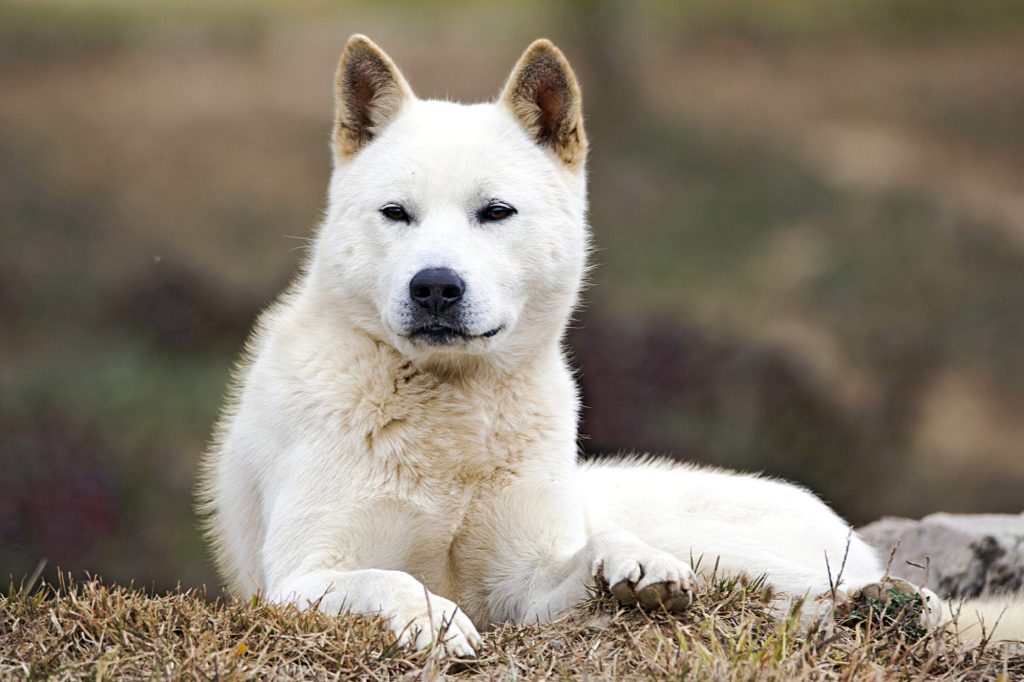
Size and Breed Category
The Jindo is a medium-sized dog breed that originated in South Korea. They are known for their loyalty, intelligence, and hunting abilities. Jindos have a muscular build and a thick double coat that comes in a variety of colors including white, black, and tan. They have a wedge-shaped head with small, triangular ears that stand erect. Jindos have a strong and agile body that allows them to move quickly and efficiently. They are typically between 18-23 inches tall and weigh between 35-50 pounds.
Jindos are classified as a spitz-type dog breed, which means they have a wolf-like appearance. They are known for their independent nature and can be reserved with strangers. Jindos are highly adaptable and can thrive in a variety of environments, including urban and rural areas. They are also known for their strong prey drive and should be socialized with other animals from a young age. Jindos are a highly valued breed in South Korea and are considered a national treasure. They are known for their loyalty and devotion to their owners and make excellent family pets.
Fur Length and Colour
The fur of a Jindo is typically short and dense, with a coarse texture. The fur is designed to protect the dog from the harsh weather conditions of its native Korea. The fur is usually a solid color, with shades ranging from white to black, and everything in between. Some Jindos may have a brindle pattern, which is a mix of two or more colors in a striped pattern. The fur on the Jindo’s tail is typically longer and bushier than the rest of its body, giving it a distinctive look. Overall, the Jindo’s fur is an important part of its physical makeup, providing both protection and aesthetic appeal.
The color of a Jindo’s fur can vary depending on the individual dog. Some Jindos have a solid color, while others may have a mix of two or more colors. The most common colors for Jindos are white, black, and tan. Some Jindos may have a brindle pattern, which is a mix of two or more colors in a striped pattern. The color of a Jindo’s fur can also change as it ages, with some dogs becoming lighter or darker over time. Regardless of the color, the fur of a Jindo is an important part of its identity and is often a source of pride for its owners.
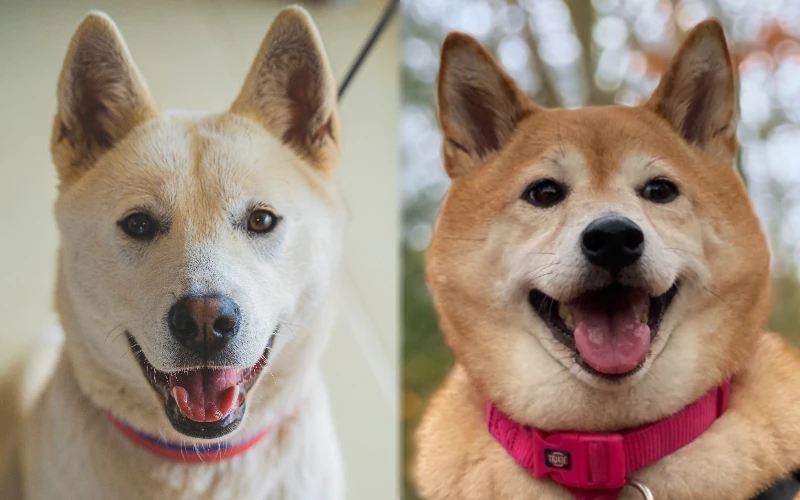
Termperament and Trainability
Jindo dogs are known for their independent and strong-willed temperament. They are a breed that requires an experienced owner who can establish themselves as the pack leader. Jindos are loyal and protective of their family, but can be wary of strangers. They are not typically recommended for households with small children or other pets, as they have a high prey drive and may view them as potential prey. Jindos are also known for their vocal nature, often barking to alert their owners of any perceived threats. With proper socialization and training, Jindos can make excellent companions for those who are willing to put in the time and effort to work with their independent nature.
In terms of trainability, Jindos can be a challenge for novice dog owners. They are intelligent and quick learners, but can be stubborn and resistant to training if they do not see the value in it. Positive reinforcement methods, such as treats and praise, are recommended for training Jindos. Harsh or punitive methods can cause them to become defensive or aggressive. Jindos excel in activities that allow them to use their natural instincts, such as hunting or agility. They also require regular exercise and mental stimulation to prevent boredom and destructive behavior. Overall, Jindos are a unique and fascinating breed that require a dedicated owner who is willing to work with their independent nature.
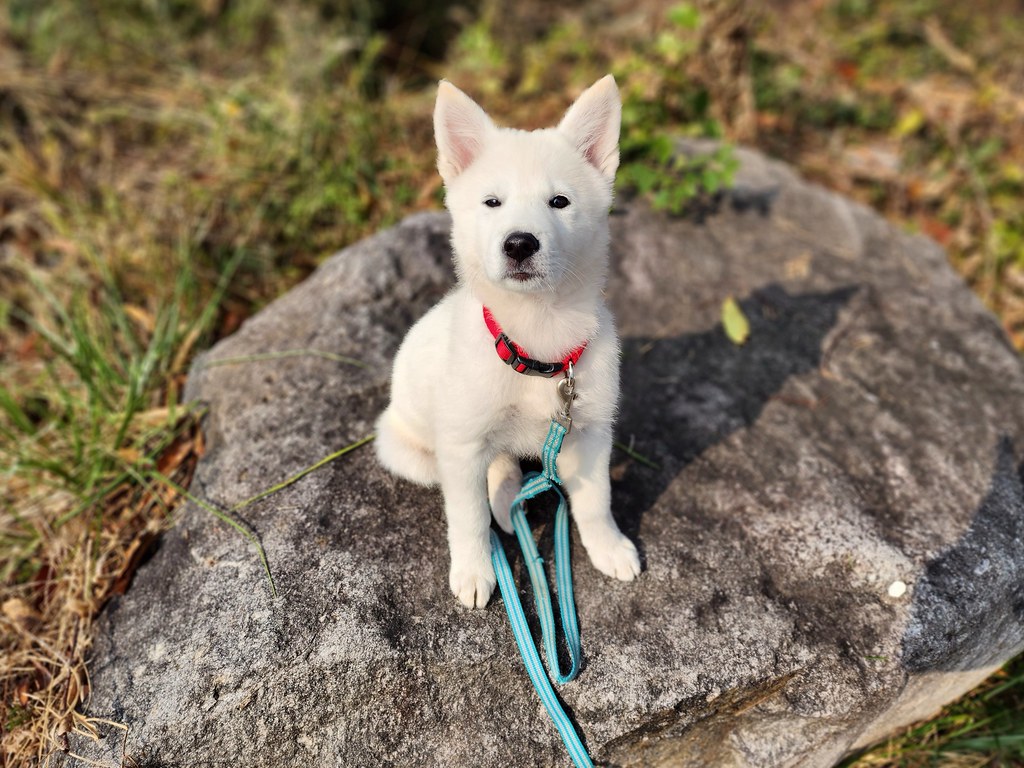
Known Health Conditions
Jindo dogs are known to be prone to certain health conditions. One of the most common issues that affect this breed is hip dysplasia. This condition occurs when the hip joint does not develop properly, leading to pain and discomfort for the dog. Jindos are also at risk of developing allergies, which can cause skin irritation, itching, and hair loss. Additionally, this breed is susceptible to eye problems such as cataracts and glaucoma, which can lead to vision loss if left untreated.
Another health concern for Jindo dogs is ear infections. Due to their floppy ears, Jindos are more prone to developing infections caused by bacteria or yeast. These infections can cause discomfort, pain, and even hearing loss if left untreated. Jindos are also at risk of developing autoimmune diseases, which occur when the immune system attacks healthy cells in the body. This can lead to a range of symptoms, including joint pain, fever, and fatigue. It is important for Jindo owners to be aware of these potential health issues and to take their dogs for regular check-ups with a veterinarian.
Openness to Strangers
Jindos, native to South Korea, have a reputation for being cautious around strangers. This is likely due to their history as hunting dogs, where they were trained to be wary of unfamiliar people and animals. However, with proper socialization and training, Jindos can become more open to strangers. They are known to be fiercely loyal to their owners and can be protective of their family and home. Jindos are also intelligent and independent, which can make them more challenging to train than some other breeds.
Despite their initial wariness, Jindos can form strong bonds with new people if introduced properly. They are not typically aggressive towards strangers, but may be reserved or aloof until they feel comfortable. Jindos are also known for their strong prey drive, which can make them unsuitable for homes with small pets. Overall, Jindos are a unique and fascinating breed with a complex personality that requires patience and understanding from their owners.
Playfulness Level
The Jindo is a highly energetic and playful dog breed that loves to engage in various activities. They are known for their love of play and their ability to keep themselves entertained for hours on end. Whether it’s playing fetch, running around in the park, or simply chasing after their own tail, the Jindo is always up for a good time. They are also highly intelligent and can quickly learn new games and tricks, making them a great companion for those who enjoy spending time with their pets.
Despite their playful nature, the Jindo is also a highly independent breed that can be quite stubborn at times. They are known for their strong will and their tendency to do things their own way, which can make training them a bit of a challenge. However, with patience and persistence, the Jindo can be trained to be a well-behaved and obedient companion. Overall, the Jindo’s playful nature and independent spirit make them a great choice for those who are looking for a fun-loving and loyal pet.
Suitability as a Pet for Children
Jindo dogs have a strong and independent nature, making them a suitable pet for children who are able to handle their assertiveness. They are highly intelligent and loyal, making them great companions for families who are willing to put in the time and effort to train and socialize them properly. Jindos are also known for their high energy levels, so they require plenty of exercise and mental stimulation to keep them happy and healthy. Overall, Jindos can make wonderful pets for families who are willing to provide them with the love, attention, and training they need to thrive.
Exercise Needs
Jindos are highly active dogs that require a significant amount of exercise to maintain their physical and mental well-being. As a medium-sized breed, they typically require at least 60 minutes of exercise per day, which can be achieved through a combination of walks, runs, and playtime. Jindos are known for their high energy levels and love of outdoor activities, so owners should be prepared to provide them with plenty of opportunities to run, jump, and explore. In addition to physical exercise, Jindos also benefit from mental stimulation, such as training sessions and interactive toys, to keep their minds engaged and prevent boredom.
Due to their history as hunting dogs, Jindos have a strong prey drive and may be prone to chasing small animals. As such, it is important to ensure that they are exercised in a safe and secure environment, such as a fenced yard or on a leash. Jindos also thrive on routine and consistency, so owners should aim to provide them with a regular exercise schedule that they can rely on. While they are adaptable to different living situations, Jindos are best suited to homes with access to outdoor space and owners who are committed to meeting their exercise needs. Overall, Jindos are active and energetic dogs that require a significant amount of physical and mental stimulation to stay happy and healthy.
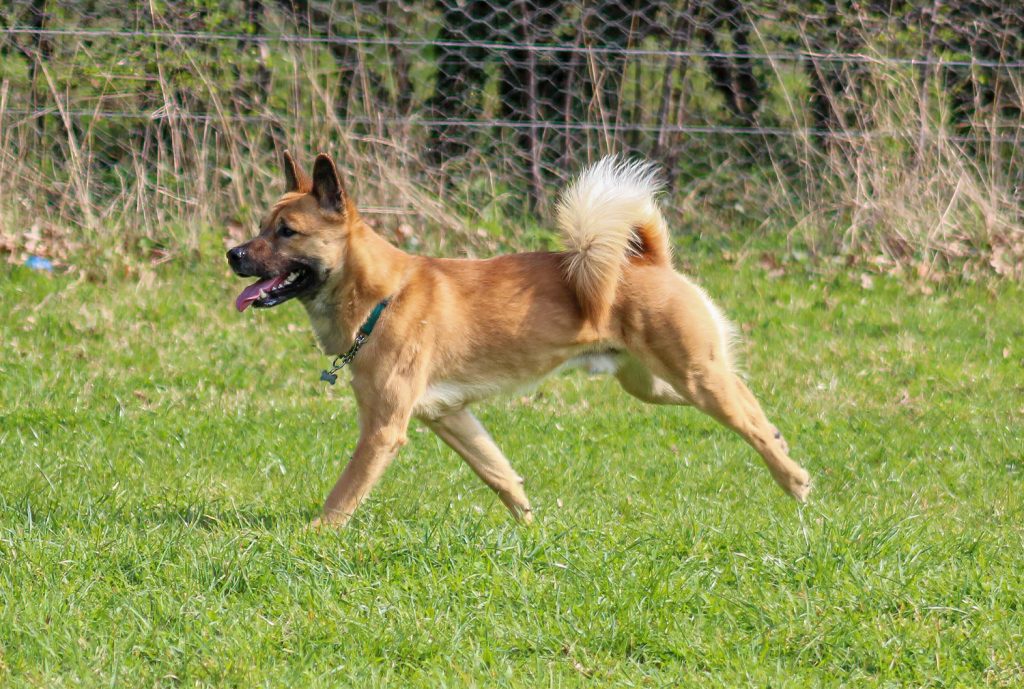
Suitability for a Multi-Pet Family
Jindos have a reputation for being independent and strong-willed. They may not always get along with other pets, especially if they are not socialized properly from a young age. However, with proper training and socialization, Jindos can learn to coexist peacefully with other pets in the household. It is important to supervise interactions between Jindos and other pets, especially during the initial introduction period. Additionally, Jindos may be more likely to get along with pets of the opposite sex.
Housing Requirements
Jindo dogs require a living space that is large enough for them to move around freely. They are active dogs that need plenty of exercise, so a house with a garden or access to a park is ideal. The garden should be securely fenced as Jindos are known to be escape artists. They also need a comfortable and warm place to sleep, away from any drafts. A dog bed or a crate with a soft blanket is recommended. Jindos are clean dogs and require regular grooming, so a designated area for grooming and bathing is also necessary.
In terms of feeding, Jindos require a balanced diet that is appropriate for their age and activity level. They should be fed twice a day, with the amount of food depending on their weight and energy requirements. Fresh water should be available at all times. Jindos are intelligent dogs that require mental stimulation, so toys and puzzles are recommended to keep them entertained. They also need regular socialization and training to prevent any behavioral issues. A dedicated owner who can provide plenty of attention and care is essential for the well-being of a Jindo.
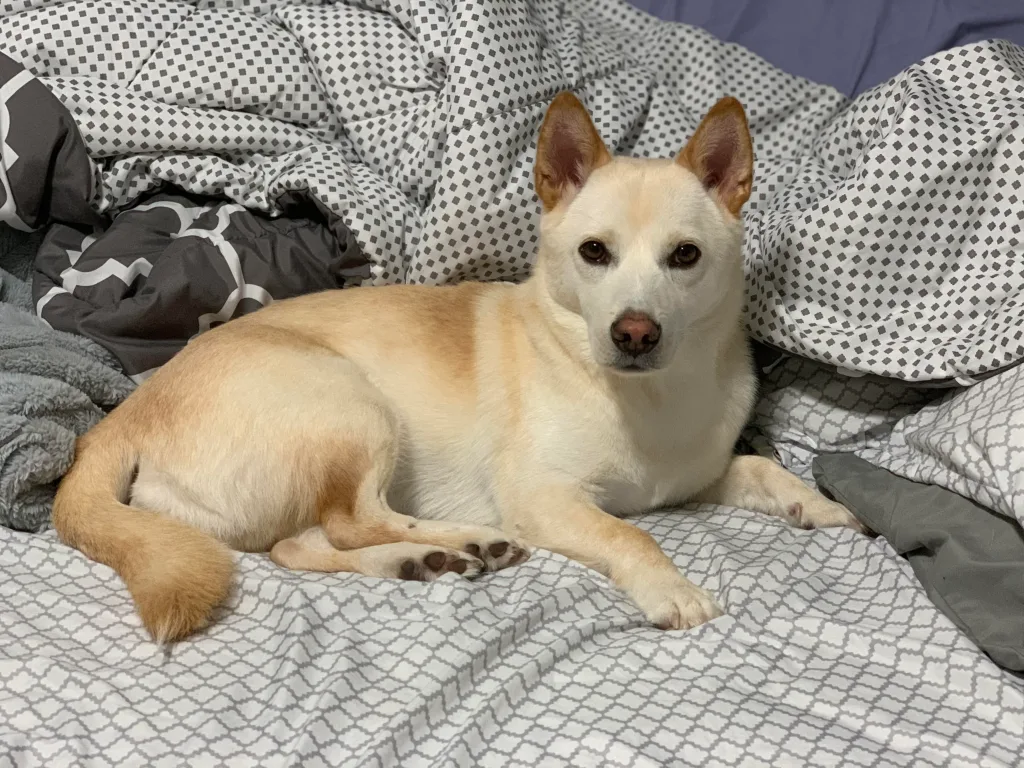
Summary
Jindos have a reputation for being fiercely independent and loyal to their owners. They are known for their intelligence and ability to adapt to different environments. However, they require a lot of socialization and training from a young age to prevent aggressive behavior towards other animals and strangers. Jindos are not recommended for first-time dog owners or families with young children. They require a lot of exercise and mental stimulation to prevent destructive behavior. Overall, Jindos can make great pets for experienced owners who are willing to put in the time and effort to properly train and socialize them.
Jindo Dog FAQS
Jindos are intelligent but can be stubborn, so consistent training and positive reinforcement are important.
Jindos can be good with children if socialized properly, but they may not tolerate rough play.
Jindos may have a high prey drive and may not get along with other pets, especially small animals.
Jindos can adapt to apartment living if they receive enough exercise and mental stimulation.
Jindos are generally healthy, but they may be prone to hip dysplasia and allergies.
Yes, Jindos shed heavily twice a year and require regular grooming.
Jindos typically weigh between 18-25 kg and stand 50-55 cm tall at the shoulder.
Jindos are active dogs and require at least 1-2 hours of exercise per day.
Jindo is a breed of dog that originated in Korea.
Jindos typically live between 12-15 years.
